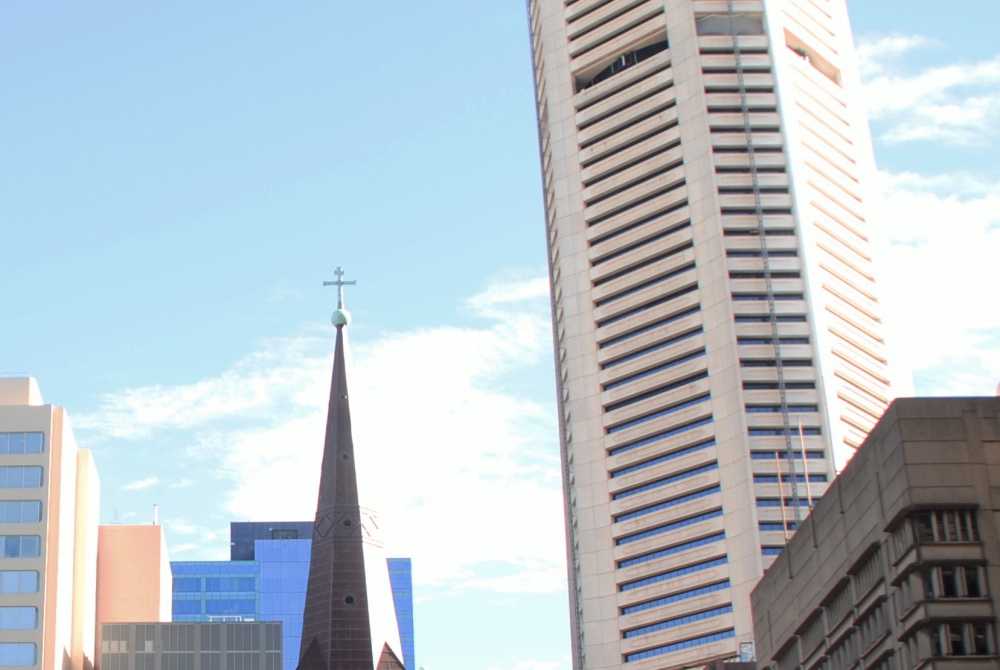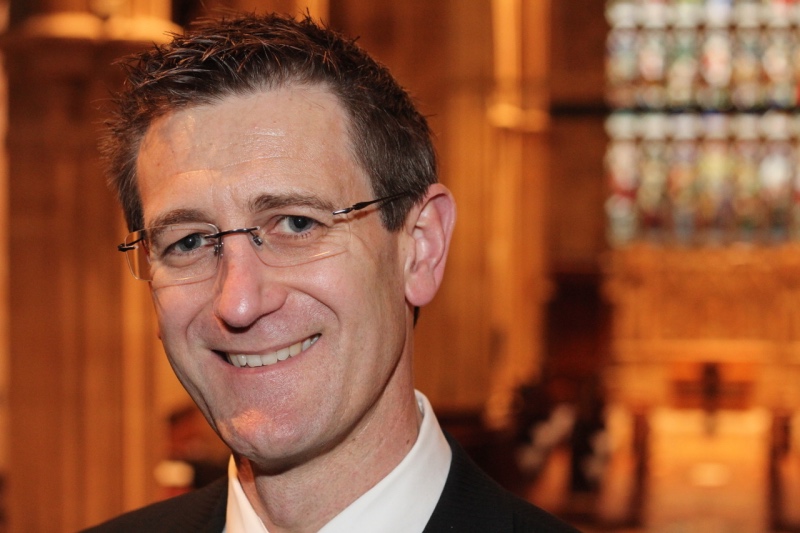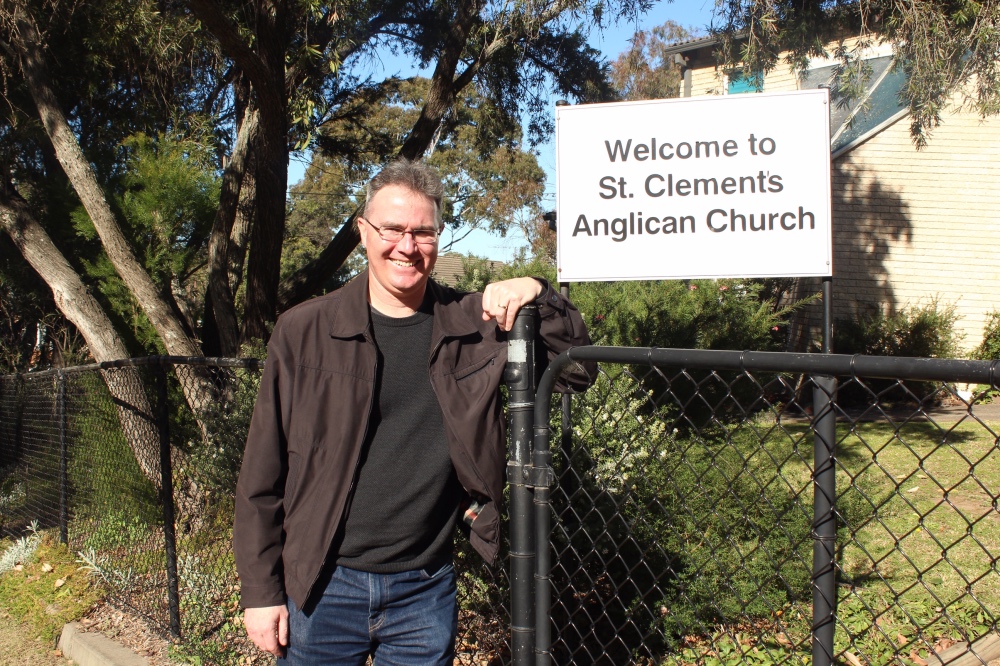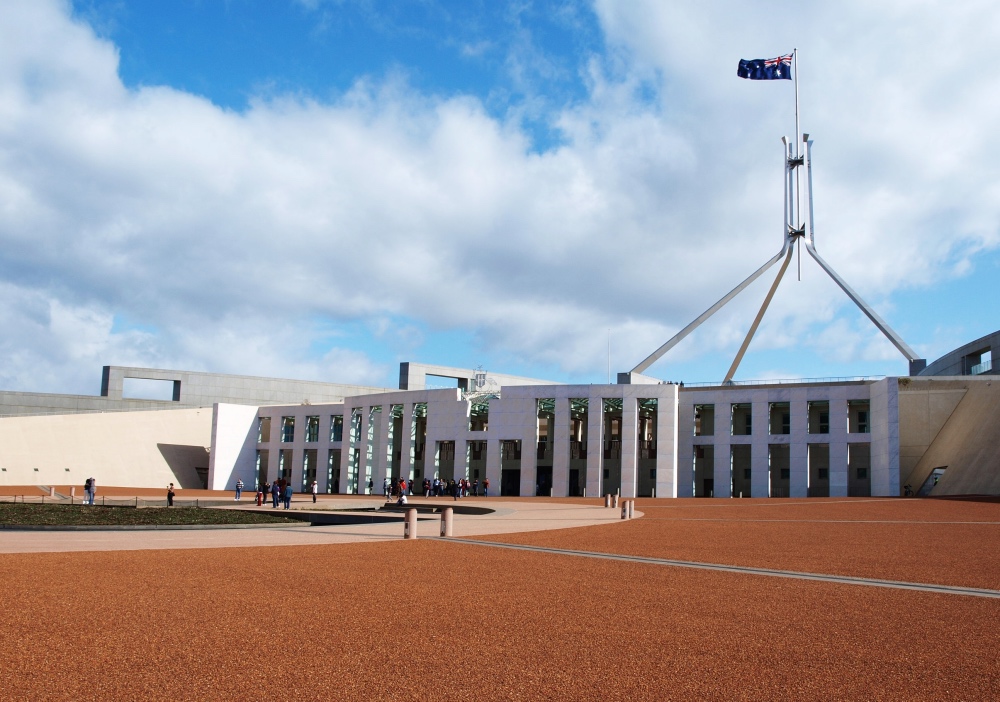
CHRISTOPHER GILBERT reports on responses to the proposed Religious Discrimination Act in Australia…
Sydney, Australia
Religious freedom has been a hot topic of conversation among church denominational leaders, lawyers and lobby groups in Australia as they have grappled with how the country’s proposed Religious Discrimination Act should be shaped.
And while there seems to be general agreement on ways to fix the draft bill to adequately protect the freedom of religious individuals and their associations, there are quite different views on whether the bill is the best way to go about strengthening religious freedom, or simply the freedom to act on one’s conscience as Australians, religious or not.

A church steeple in the Sydney skyline. PICTURE: David Adams
“This is the first time religious freedom has been framed as a positive right in Australian legislation,” notes Anglican Bishop Michael Stead, referring to clause 41 of the bill.
His point is also one made by the Australian Catholic Bishops Conference, who – while noting the draft needs further work – say they see the legislation as “important because, as well as protecting against discrimination on the grounds of religious belief or activity, it provides a positive expression of the right to religious freedom in clauses 10 and 41”.
Bishop Stead, meanwhile, points out that until now, various state anti-discrimination acts protecting people according to their age, sex, disability and race have required exemptions to be inserted so that religious organisations and people holding particular religious beliefs may remain free to maintain their difference in belief, association and behaviour.

Anglican Bishop Michael Stead PICTURE: Supplied.
“This is the first time religious freedom has been framed as a positive right in Australian legislation.”
– Anglican Bishop Michael Stead
The buzz word for these exemptions is “carve out”, a word which raises for many the objection that religious people and their organisations seem to have a special right to hurt others. That’s the argument of organisations like the Australian Secular Lobby.
But, in a highly regarded submission to the Ruddock Commission in 2018, law lecturer Mark Fowler detailed how governments have exempted religious organisations, charities and schools from laws applying to the more general secular conduct of business, charitable work, schooling and government for good reason.
He documented the ways the states have begun to take those freedoms away, especially through work place anti-discrimination laws which strip from charities like Vinnies and the Salvos the freedom to hire only people who share the values and beliefs of their religious denomination. His submission showed how this subverts the Federal Government’s obligation to ensure religious freedom in Australia under the International Covenant of Civil and Political Rights.
The Australian Government, which closed submissions on the bill on 2nd October, is keen to have new legislation in place before the end of the year. But the new Religious Discrimination Act will be just step one of a two step process through which the government aims to strengthen freedom of belief and freedom to act from that belief. The second step will come after the Australian Law Reform Commission makes its recommendations on the deeper concerns of the Ruddock report later into 2020.
That makes that proposed Religious Discrimination Act the Federal Government’s first response to issues which were identified in Ruddock’s report and raised by hundreds of groupings, religious and secular, following the rancorous plebiscite that ultimately legalised same-sex marriage in Australia – a move which came despite the fact that most of the historic religious faiths – including Roman Catholic, most Protestants, Orthodox, Jewish, Muslim, and Hindus – regard marriage as a covenant between a man and a woman only.
Former Deputy Prime Minister John Anderson wonders why we need legislation that provides exceptions in the case of religious belief when it should be much more fundamental in our societies to recognise that religious freedom is the first freedom from which all others have come, especially in the history of the English speaking West.
He says the characterisation of Christian faith as destructive to our society is a distortion of Western history.
“Our politicians have a deeply alarming lack of understanding of our cultural roots,” he says.

Rev Mark Tough, senior minister at St Clement’s Anglican Church Lalor Park and Kings Langley in Sydney’s west.
Rev Mark Tough, senior minister of St Clement’s Anglican Church Lalor Park & Kings Langley in Sydney’s west, agrees. He has made it his business to inform local and federal parliamentarians on the issues being faced by his congregants where they are experiencing discrimination because of their Christian faith. He has found a welcome mat and listening ears from members of both major political parties.
“My biggest concern is with the Christian school in Blacktown where I send my own children,” he says. “We only employ Christian staff and believe that it’s important that Christian faith be modelled in all its facets to the children. I’m concerned that government wants to take choices like this away from parents.”
Tough says he wants an Australia that advocates a “civilised pluralism” that takes care of people of faith as well as people who don’t espouse a faith. And he encourages Christians and their leaders to take the opportunity of speaking with the elected members of the Labor Party, which he believes is now signalling its mistake in ignoring people of faith.
The Anglican Diocese of Sydney has itself outlined seven key revisions it believes are needed in the draft law.
“My biggest concern is with the Christian school in Blacktown where I send my own children. We only employ Christian staff and believe that it’s important that Christian faith be modelled in all its facets to the children. I’m concerned that government wants to take choices like this away from parents.”
– Rev Mark Tough, senior minister of St Clement’s Anglican Church Lalor Park and Kings Langley in Sydney’s west.
The areas needing change, says the diocese, include clause 10, where conducting a commercial activity, such as Anglicare’s counselling service, robs the service of the right to protect its religious ethos. Or where the bill looks for a church to “act in accordance with its doctrines” in matters of employment – Bishop Stead notes there are no doctrines when it comes to the practice of employing people of the same belief.
The bishop adds that definitions of legal words like “vilify” are also needed to assist judges to know the specific acts that are being referred to by the legislators.
“It’s a good bill that currently has some significant drafting problems that need to be addressed,” says Stead. “Once fixed we’d be very happy to see this.”
And while the bill doesn’t address the issue of competing human rights – something which figures large in the International Covenant of Political and Civil Rights – Stead hopes this will be addressed when the Australian Law Reform Commission submits its report to the government in 2020.
Other denominational organisations which have made submissions on the bill include Baptist Churches of New South Wales and ACT.
It doesn’t see the anticipated Religious Discrimination Act as a panacea.
“We’re not done with this yet because some of the most contentious things from the Ruddock Commission Report are still with the Law Reform Commission,” says Rev Dr Steve Bartlett, director of ministries for the Baptist Churches of NSW and ACT. “Really [when this bill passes] the job is only half done – the easy half.”
But, Bartlett adds, Baptist Churches are glad to engage and acknowledge the good work and goodwill in the drafting of legislation that aims to strengthen a right to hold religious convictions in Australia.

The Australian Parliament where the bill is expected to be introduced later this year. PICTURE: Dianlin Huang (licensed under CC BY-NC 2.0)
The necessity of any new federal legislation is strongly denied by Fiona Patten, a Victorian MP and head of the Australian Secular Lobby who recently debated the issues with Australian Christian Lobby Managing Director Martyn Iles at the Australian National Press Club.
As part of her pitch, Patten drew on the submission of the Uniting Church’s General Assembly which stated that churches don’t need what Patten characterised as “carve out” legislation (that is, legislation which provides exemptions from existing anti discrimination laws).
In response, Iles explained how he created a law practice three years ago to defend people of faith who are coming to him having lost their jobs, their careers and their study opportunities. He provided several examples of how people in business, government and at universities objected to his clients’ religious convictions or affiliations and terminated their studies or employment after subjecting them to demeaning disciplinary hearings. Iles added that these cases now number in the hundreds.
“I see a rising trend of intolerance and I see this [legislation] as genuinely helpful. It isn’t a licence for bigotry. That simply betrays the fact that we are now calling bigotry, anything we don’t like.”
– Martyn Iles, managing director of the Australian Christian Lobby in an address to the National Press Club.
“I see a rising trend of intolerance and I see this [legislation] as genuinely helpful,” he said. “It isn’t a licence for bigotry. That simply betrays the fact that we are now calling bigotry, anything we don’t like.”
Debate over the Religious Discrimination Bill has revealed divisions between secular Australians and those of religious faiths and that fact is at least partly responsible for the cautious way in which the government has approached the issue.
According to Anderson, the accusation from people like Patten that the bill is a “carve out” has some legitimacy. Which is why he regards the current legislative efforts as inadequate to ensure a freer Australian future. And, in explaining how we got to this place, he suggests the churches have not done a good job of speaking to the integrity of Australia’s Christian cultural roots.
The Uniting Church’s submission finds some agreement with him.
It says, “…the consistent position of the Uniting Church has been, and continues to be that legislative provisions for religious freedom would best be made through the mechanism of a comprehensive Human Rights Act, within which the competing claims and values inherent in this discussion may be grounded in a holistic approach to human rights.”
Anderson believes many Australians now fail to recognise the fundamental importance and primacy of freedom of conscience and belief to a free nation.
“Freeing the forum of our minds to seek truth and act on it when we’ve formed a judgment on what truth is, is the very measure of the freedom of a democratic society like Australia,” he says. “Where this lands will be profoundly important for the nation not just for people of faith today.”





